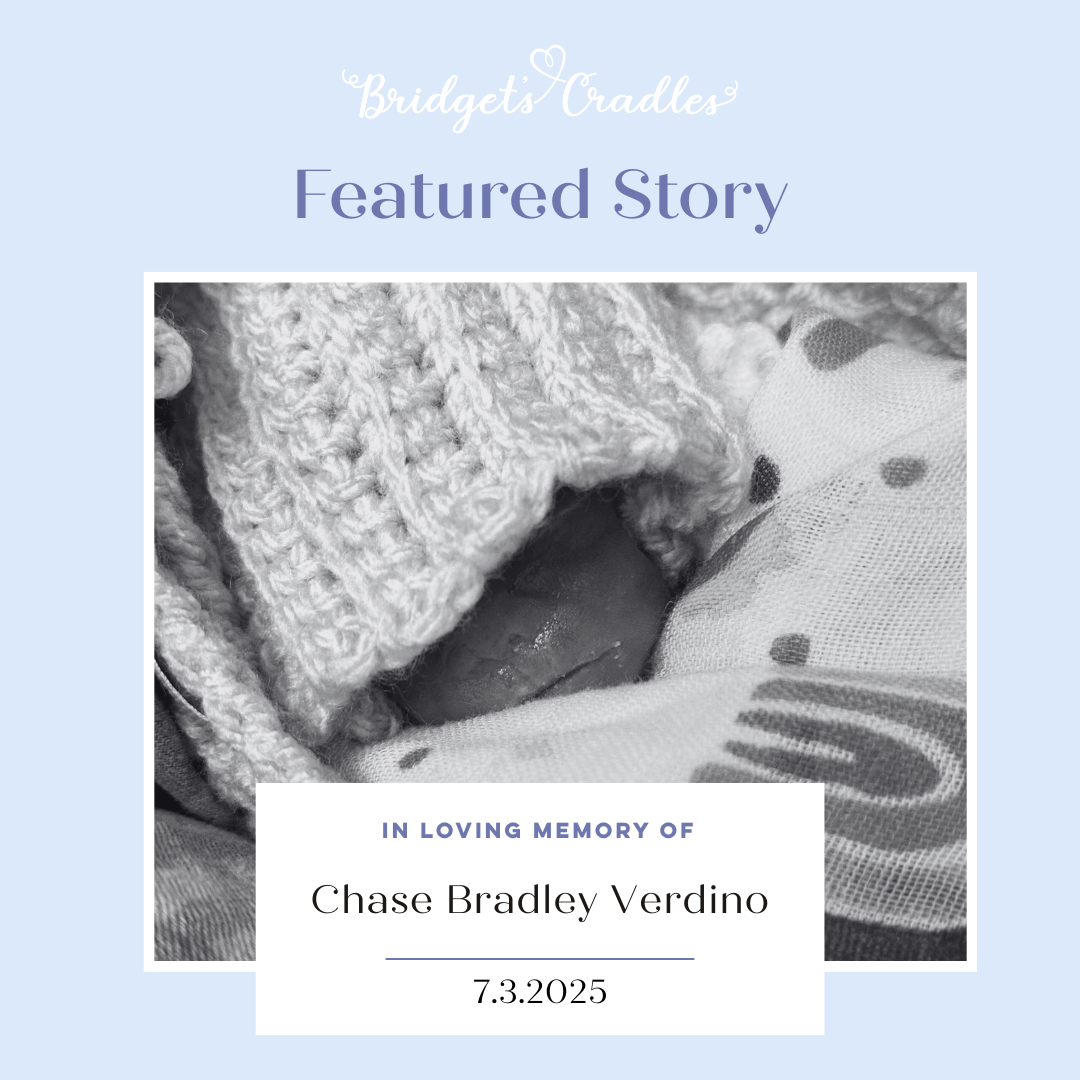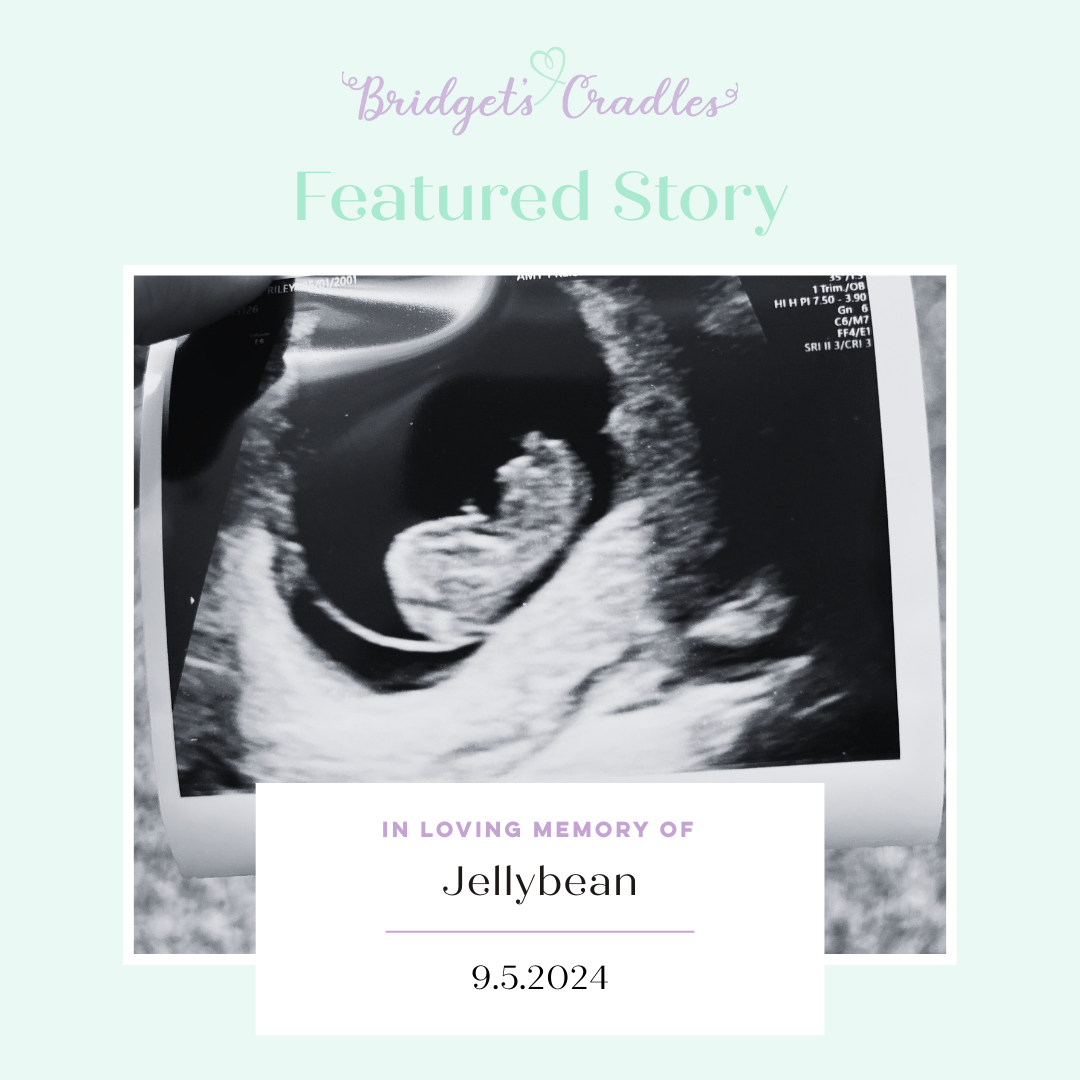Wave of Light | October 15, 2025 Register Now
registration open!
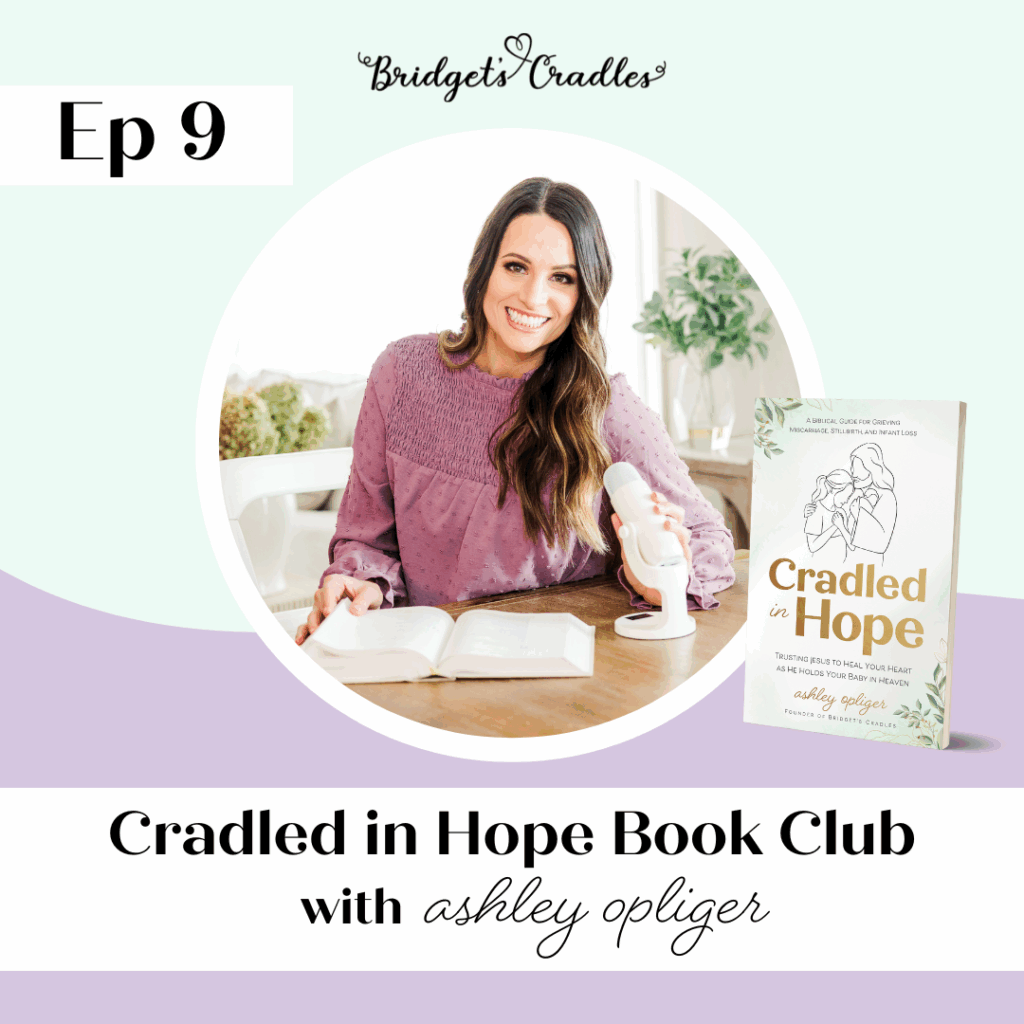
In this episode, Ashley speaks to the deep wounds that can come from others’ words—or their silence—after the loss of a baby. Centered on Chapter 8 of Cradled in Hope, “They Know Not What They Do: When You Are Hurt by Others,” she gently walks alongside grieving moms who have experienced secondary pain in the wake of their primary loss. Whether through insensitive comments or heartbreaking absence, Ashley shares how Jesus understands—and how He calls us to respond with grace.
Through personal stories, biblical wisdom, and practical tools, Ashley invites listeners to process their relational grief with honesty and hope. With heartfelt compassion, she shares how Jesus, even in His own suffering, forgave those who hurt Him—and how we, too, can follow His example, even when it’s hard.
In this episode, Ashley shared:
- How a stranger’s comment at a park triggered unexpected waves of grief
- The “Tale of Two Cups” analogy that explains why small remarks can feel so big when our emotional cup is full
- The concept of the “Grace Cup”—a mindset of pre-filling our hearts with grace for others
- Real-life examples of insensitive things people say—and how to lovingly respond or set boundaries
- How to identify your love language in grief and communicate your specific needs to others
- Why some friendships fade while others deepen—and how grief can clarify who your true community is
- Encouragement to forgive those who’ve hurt you, even if they never realize it—just as Jesus did on the cross
- An invitation to find support through Bridget’s Cradles’ Hope Online groups or your local community
Ashley reminds us that while grief may reveal who stands beside us and who stays silent, God is always faithful. And He often brings new, meaningful relationships in the midst of our pain. In Jesus, we find the grace to forgive, the wisdom to communicate, and the strength to heal.
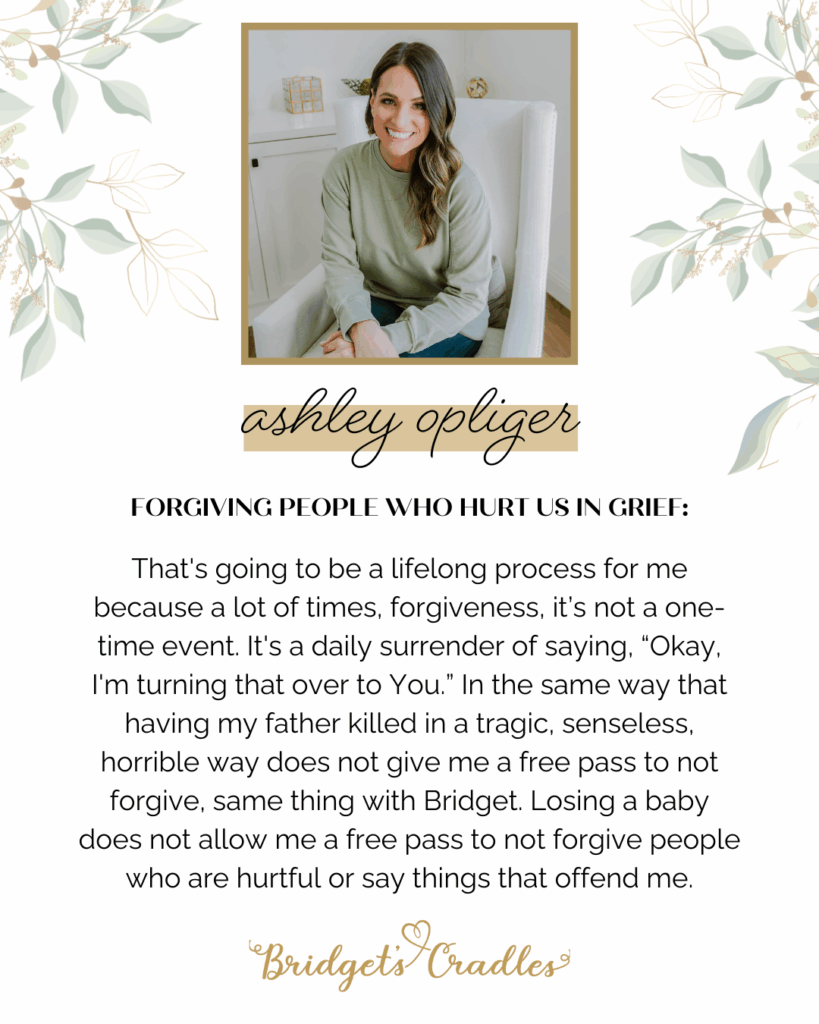
Journaling Prompt
Did you relate to the Tale of Two Cups? Are your emotions at the brim? How would adopting the Grace Cup mentality change your outlook? Ask the Lord to give you a heart posture of grace and prepare you to pour it when hurtful words arise.
Healing Step
Turn to the section in the chapter about love languages and consider what you need from others right now. Reach out to someone who comes to mind and express your needs to them. Use Ashley’s wording examples on pages 143–144 as a starting point if helpful.
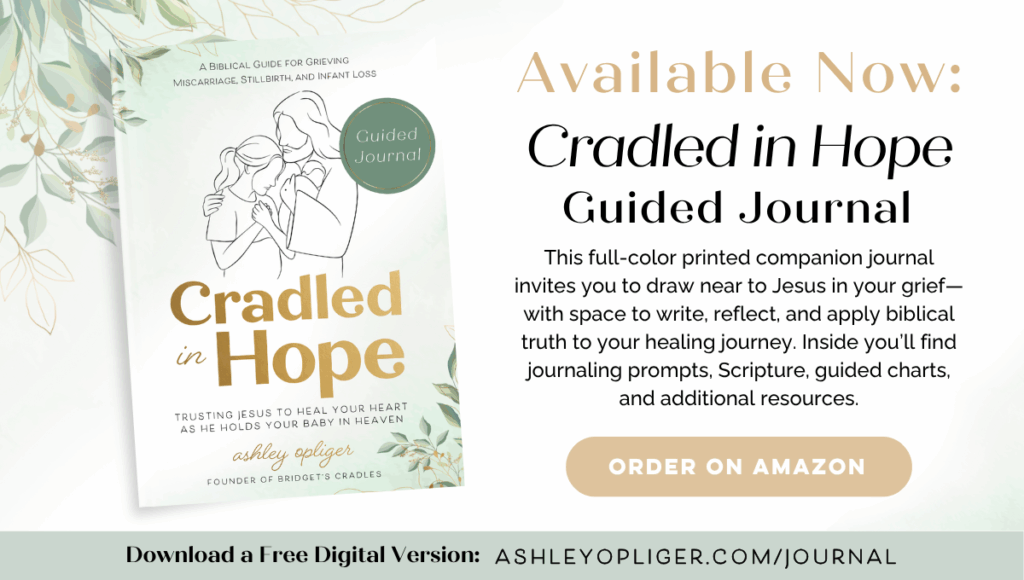
Full transcript below.

New episodes will be shared on the 1st of every month. Don’t miss a single episode…subscribe wherever you podcast!
Please also leave a review to help spread the message of hope with other grieving mommas!

MEET OUR HOST
Ashley Opliger is the Executive Director of Bridget’s Cradles, a nonprofit organization based in Wichita, Kansas that donates cradles to over 1,600 hospitals in all 50 states and comforts over 30,000 bereaved families a year.
Ashley is married to Matt and they have three children: Bridget (in Heaven), and two sons. She is a follower of Christ who desires to share the hope of Heaven with families grieving the loss of a baby.
Connect with Ashley:
Facebook /ashleyopliger
Instagram @ashleyopliger
Pinterest /ashleyopliger
www.ashleyopliger.com
Follow Bridget’s Cradles:
Facebook /bridgetscradles
Instagram @bridgetscradles
Pinterest /bridgetscradles
www.bridgetscradles.com
JOIN OUR FACEBOOK GROUP FOR GRIEVING MOMS
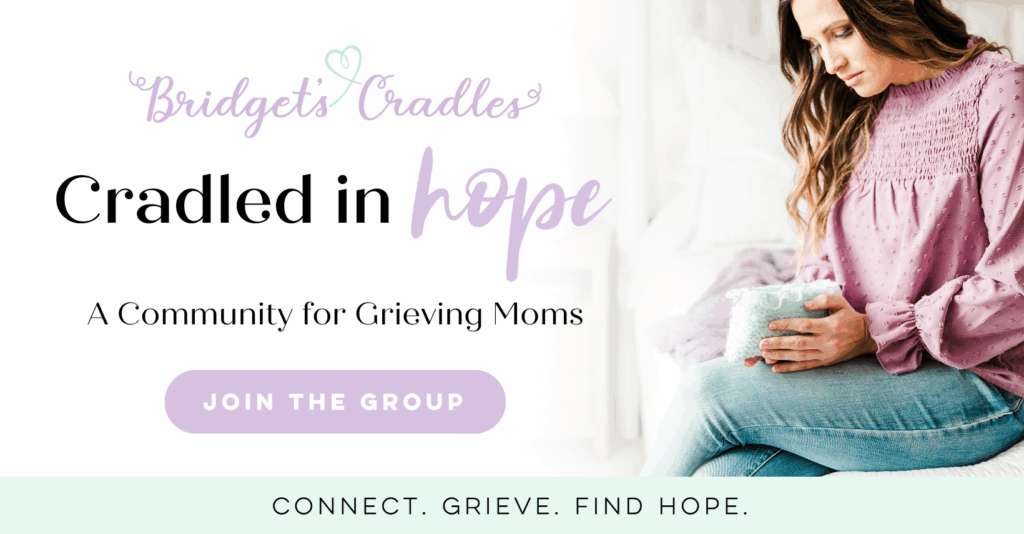
EPISODE TRANSCRIPT
Ashley Opliger: [00:00:00] Welcome to the Cradled in Hope Podcast Book Club.
I’m your host, Ashley Opliger—grieving mom, author of Cradled in Hope, and founder of Bridget’s Cradles. I’m so honored to walk with you through my book, one chapter at a time, as we navigate the heartbreak of losing a baby together.
After my daughter Bridget went to Heaven at 24 weeks, I wrestled with deep sadness and complex questions about God’s goodness. But through that grief, Jesus showed me that He not only cradles our babies in Heaven, He also holds our broken hearts here on earth.
Whether you’re reading along or simply listening in, this is a safe space for your sorrow—a place where your tears, questions, and raw emotions are welcome. Each episode, we’ll reflect on a chapter of Cradled in Hope and gently walk together from heartbreak to healing, and from pain to purpose.
My prayer is that this podcast will remind you that you are not alone in your grief and, most importantly, that it will point you to Jesus, the only One who can truly heal your heart. Through faith in Him, there is hope to see your baby again, and He will be with you every step from here to Heaven.
So wherever you are in your journey, I invite you to join me—and together, we will grieve with hope.
Let’s begin.
Ashley Opliger: [00:01:22] Hi friends. Welcome back. Today, we are diving into Chapter Eight. They Know Not What They Do: When You Are Hurt By Others.
[00:01:29] This chapter, as the title explains, this is when you have been hurt by other people in your season of grief, and so this might be friends, family members, co-workers, neighbors, or even strangers. And we’re going to talk about the different ways that people can hurt us while we’re grieving the loss of a baby and how we can respond to that.
[00:01:51] I am going to start by focusing on our key passage from the chapter, which comes from Luke 23:33-34, “And when they came to the place that is called the Skull, there, they crucified Him and the criminals, one on His right and one on His left. And Jesus said, ‘Father, forgive them, for they know not what they do.’”
[00:02:12] As you can tell, I use the line that Jesus said, “for they know not what they do,” that is the title of this chapter. What I am trying to argue here is that just as Jesus forgave the Roman soldiers who were crucifying Him, and He had grace for them, which is really hard to imagine how you could forgive someone as you are suffering physically and emotionally. You’ve been spit at, you’ve been mocked, you’ve been whipped, a crown of thorns was thrust on your head, you were beaten, and now you’re being crucified and you are in excruciating pain on the cross. And Jesus’ heart was to say, “Forgive them, for they know not what they do.”
[00:02:51] Throughout this chapter, we’re going to be talking about how there are many well-meaning people in our lives that are going to say certain things, trying to be helpful, and their words are actually going to be hurtful. And how do we navigate those friendships and relationships with family members when people have hurt us by saying insensitive things?
Or it might be that they’ve said nothing at all, which sometimes silence can be even more hurtful when you feel as though people close to you should be asking you how you’re doing, should be talking to you about your baby, and they say nothing and you feel very lost and alone.
[00:03:27] So let’s dive into this chapter. I start this chapter with a story, as I do most of my chapters, and so let me set the stage for this story. This was several years after Bridget went to Heaven. I had my oldest son; at the time, our youngest son was not born yet.
[00:03:43] And so I’m there at this park. My son is playing up on the playground equipment, and there’s another mom there with her son and daughter. And they’re all playing, and as my son passed, the little boy made a comment to his mom and said, “Oh, he doesn’t have a sister like me.”
And the mom, just looking at my son, seeing that he was there alone with me, said, “Yeah, he doesn’t have a sister.” And I know this story doesn’t seem like a big deal, but if you are grieving, as you all are, you know how hurtful these kinds of comments can be, especially when they blindside you.
[00:04:17] You’re not expecting for a stranger to say something that really hits in a deep and sensitive, tender part of your heart. When I heard her say, “He doesn’t have a sister,” it was so triggering for me because he does have a sister. She’s in Heaven and they can’t see her. And I really got emotionally triggered.
[00:04:36] It made me really sad to think about the fact that this other little boy had a sister to play with on earth and at the playground, and my son was there alone. And so this comment actually really brought a lot of sadness to my heart, and it derailed my day. It was putting my emotions into a tailspin, and I needed to leave. It really affected the rest of my day.
[00:04:57] And there might be some of you that are thinking, “Wow, that was quite a reaction for such a small comment.” But maybe you know how this feels because someone has said something insensitive to you. Other examples of things people say, and they do not intend to hurt me by saying these things, but they’ll see that I have two boys now, and they’ll say, “Oh, you’re a boy mom.”
[00:05:17] And yes, I am a boy mom. I do have two boys. But I feel like when they say that, they’re inferring that I only have boys because usually you say girl or boy mom when all of their children are that gender. And so that sometimes will really hurt me because I think to myself, “I do have a daughter. She’s just not here on earth. She’s in Heaven,” and it can cause grief to resurface for me.
[00:05:37] And so as I talk about this situation. I introduce the idea of these cups, and I have quite a few cup analogies in this chapter, and I want you to read it because I’m not going to be able to go into all of them, but I’m going to introduce a couple of them.
[00:06:00] The first one is there’s A Tale of Two Cups. And so I want you to imagine there’s two cups sitting on the counter. One has water that’s completely to the brim. It’s right there at the very top. The other cup has about an inch or two inches left of space for you to add more water if you wanted to. And it’s full, but it’s not completely to the brim.
[00:06:22] I want you to now imagine dropping one little dropper of water into each of those cups. Now the cup that has two inches left of space at the top, it’s going to drop in there. It might cause a little ripple on the surface of the water, but that’s going to be it. On the cup that’s full, if you put a drop of water in there, it’s going to spill over.
[00:06:43] And essentially, this is how a psychiatrist explained this to me, how sometimes small situations or comments can lead to big emotions and overreactions. And for me, it was, my cup was full to the brim. I was grieving.
[00:07:00] I had a lot of stress and overwhelm in my life at that time, and so one little comment had the power to just completely spill over all of this pent-up grief. And that is essentially what grief and trauma can do to you.
[00:07:16] You know when things are normal and you’re not actively grieving, you’re not going through a hard time, you have a little bit of margin in your cup, and so if something small happens in your day, it usually is not going to cause a major situation or an emotional tailspin.
But when you’re grieving, you really are emotionally at the brim, and so any little thing can cause everything to spill out and over. And that analogy really helped me understand why sometimes I reacted the way that I did.
[00:07:43] The next cup analogy that I use is the example of The Grace Cup. And the grace cup is essentially a term that I came up with to explain how we need to prefill a cup of grace and be ready and willing to pour that onto other people.
[00:08:01] Because a lot of times when you’re grieving and people say hurtful things, they come out of nowhere, and it can really happen in any given moment. I’ve had times where I’m getting my hair cut and my hairdresser will ask me how many kids I have, and then I’ll share a little bit about Bridget, and then there’s silence, or they don’t know what to say and it’s awkward. And you weren’t expecting to have that conversation at that moment.
[00:08:25] And so the idea of the Grace Cup is that we pre-fill it with grace, and we have the mentality already in our mind that at some point someone’s going to say something insensitive.
That doesn’t mean that that’s their heart, that they’re trying to offend or hurt us, but someone at some point is going to say something that’s hurtful. And if we already predetermine in our minds that that’s going to happen at some point and we can decide in advance that when they say that, we’re not going to take it to heart. We’re not going to let it wreck our day, and we will see that their comments are meant to try to comfort us, but maybe they just went about it in the wrong way or said the wrong thing because they didn’t know any better.
[00:09:09] And so the Grace Cup in my circumstance at the park was if I would’ve gone into that and when I heard the mother say, “He doesn’t have a sister,” I could have reacted differently by saying, “This mother is responding based on what she sees. She sees that my son does not have a sibling with him, so she’s just quickly answering her son’s question and she’s moving on with her day.” And truly, I do not believe that she would’ve thought anything more of it, and she was not trying to hurt me.
[00:09:37] And so when I put myself in her shoes, and I understand that she wasn’t trying to be hurtful, she had no idea, how would she ever know that I had a baby in Heaven, it changes my response and how I go about that situation and whether or not it’s going to affect me in the way that I mentioned before.
I know that it’s hard to decide to give people grace, but something that I talk a lot about in this chapter is how we have been given unmerited grace and mercy from Jesus for all of our sins and all the things that we have done.
[00:10:12] And I guarantee you, before I lost Bridget and had experienced deep grief myself, I am certain there have been times I did not respond to people who were in grief the right way. I maybe didn’t know what to say. Maybe I didn’t step in and do what I could to help someone that’s grieving because I felt uncomfortable.
[00:10:32] Certainly going through grief and trauma myself has made me a more compassionate, empathetic, understanding person to know how to care and love people who are going through grief. But sometimes people truly don’t know how to respond to these situations, and a lot of times they’re well-intended comments actually do exactly the opposite.
[00:10:52] Instead of comforting us, they can be hurtful. And so it’s so important to see their heart in it, to understand their intention, and to decide to give them grace because God has given us grace. He’s forgiven us of many sins, and we are asked to forgive them as well.
[00:11:10] And this is a really hard thing to say because it feels like, “Why should we give them grace? We’re the ones that are hurting. We’re the ones that lost a baby.” Unfortunately, losing a baby or going through something difficult does not give us a free pass to withhold forgiveness from other people.
I have been through many devastating trials in my life, and I’m walking through one right now with the loss of my dad at the hands of a drunk driver. Forgiving this man and the passenger that was involved has been and will continue to be one of the hardest experiences of my life, to choose forgiveness and to surrender them to the Lord to say, “You know what? Lord, I trust that You’re going to make this right and that they are accountable to You, not to me, and that You are going to deal with this in Your justice and in Your mercy.“
[00:11:57] And that’s going to be a lifelong process for me because a lot of times, forgiveness, it’s not a one-time event. It’s a daily surrender of saying, “Okay, I’m turning that over to You.”
And in the same way that having my father killed in a tragic, senseless, horrible way does not give me a free pass to not forgive, same thing with Bridget. Losing a baby does not allow me a free pass to not forgive people who are hurtful or say things that offend me.
[00:12:26] I want to read a verse, and it’s from Colossians 3:13, says, “Forgive one another. If any of you has a grievance against someone, forgive as the Lord forgave you.” And I think that just models Jesus’ heart on the cross of how He was willing to forgive the very people who were crucifying Him because He understood they do not truly understand that He was the Messiah, that He was and is the Son of God.
[00:12:56] And so they were doing these things under deception, and a lot of times we see the same thing happening in our world, in our brokenness. People are deceived. People do not know what to do or to say, and we need to have grace for them because Jesus has grace for us.
[00:13:15] But I do want to say there might be people in your life that are continually hurting you by either continually saying the wrong things or by ignoring your grief and not being as supportive as they could or should be.
And those situations can be really hard to navigate, especially if it’s a friend or family member, someone that’s consistently in your life and you have a relationship with, compared to a stranger, a co-worker, a neighbor. Those are different circumstances. But when it’s someone that you know very closely, and this is impacting your relationship and causing tension, we do need to find healthy ways to put up boundaries and also to communicate.
Ashley Opliger: [00:11:22] We hope you’re finding encouragement in this episode so far. We want to take a moment to share some resources our ministry offers to support grieving moms like you.
On our website, bridgetscradles.com, you’ll learn more about our nonprofit and find many hope-filled resources, including free e-books to help you plan a memorial or funeral service for your baby, meaningful ways to honor your baby in your heart and home, and gentle guidance for navigating difficult days like due dates, Heaven Days, and holidays.
We invite you to join our community of grieving moms through our Christ-centered support groups, offered both in-person at our headquarters near Wichita, Kansas, and virtually through Hope Online. These gatherings provide a place to find comfort, connection, and biblical hope alongside other moms who understand your pain.
You can view upcoming dates and sign up on our website. While you’re there, we’d also be honored for you to share your baby’s story with us.
For ongoing support, we welcome you to join our private Cradled in Hope Facebook group—a safe space for grieving moms to find friendship and walk their healing journey together.
To stay connected with us and receive faith-filled encouragement, follow us on Facebook and Instagram at @bridgetscradles, @cradledinhope, and my personal page @ashleyopliger.
Now, let’s get back to the episode.
Ashley Opliger: [00:15:15] Throughout this chapter, I have a lot of different ideas, and in this episode. I am unable to list out every single idea. But I am going to tell you what is in the book so you can go and check it out for yourself.
[00:15:27] But I talk a lot about communication, how, if it’s someone that you truly care about and you want them to continue to be part of your life, I do think that communication is very important by expressing your heart and being honest with how you feel with others and communicating your needs. Because sometimes people truly don’t know what you need or want in your grieving.
[00:15:49] And when you’re grieving, you want people to just read your mind and to know what to do and know how to support you. But sadly, a lot of times people don’t, and they’re waiting for you to take initiative and to express yourself in what you need.
And I have a section in my book where I talk about the different love languages, and I dive into each love language and how you receive love and what things you might need as you’re grieving based on what your love language is. So go check that out. That’s on page 142.
[00:16:21] Because sometimes people might be doing things for you in your grief that are nice and loving; maybe that’s not how you receive love, and so you’re not interpreting that as love or support, but they’re doing it in a different language.
[00:16:35] And so sometimes it’s helpful to tell someone exactly what it is that you’re looking for. Maybe it’s that you really just want someone to sit and listen to you and to hear your heart and not to try to fix it.
Honestly, I failed to mention, sometimes this might be your spouse that’s hurting you because they’re grieving different and they’re walking through this and they’re grieving too, but they don’t know how to support you.
[00:16:57] And so this section on love languages would be really helpful for you to dive in and study that part with your spouse, because that might help you be able to support and love each other in a way where you’re truly receiving that love and support.
I also have a table in this chapter that gives ideas on ways that you can specifically tell people what you need, and I understand that seems super awkward. It’s not comfortable telling people what you need. I would obviously use your judgment on this.
[00:17:30] It might feel weird to say this to a co-worker that you don’t know very well, but maybe it’s a closer friend that has said, “Hey, let me know if you need anything.” This might be a good opportunity to say, “Hey, actually, here are some of the things that would be really helpful to me and my family during this time.”
[00:17:46] And so I actually give specific ideas on how to word things, just a few examples. You could tell someone that you want to talk about your baby, because there are people who assume if they bring up your baby or they talk about your grief, that’s going to remind you of the situation and then make you more sad.
And they feel, “I probably shouldn’t bring it up because she’s not sad right now, so I don’t want to make her sad,” which, as you probably know and feel in your heart, you’re always thinking about your baby, and you’re already sad. And so them bringing it up does not make you more sad. At least that’s how I feel.
I feel like a lot of people have told me that. Everyone’s a little bit different, which is why it’s important to share your specific needs. But I think it’s helpful if you do want to talk about your baby, to say that and to tell people, “I do want to talk about my baby. I do want to talk about how I’m feeling and doing.”
[00:18:38] Then there’s some ideas on some specific things that you can ask for that would be practical help during your time of grief. I also mention things about how to handle your due date and Heaven Day, and different holidays in the ways that you can ask family members for specific things that you’re looking for in your grief.
[00:18:56] I also have a chart in this chapter where, if someone makes a specific kind of remark, the kinds of things where they say something and it’s not actually helpful. So if someone says, “At least you’re young and can get pregnant again,” or, “You should be grateful you have living children,” or, “God needed another angel,” or, “Your baby was too beautiful for earth,” “Everything happens for a reason,” I actually wrote responses to those common remarks as ways that you might be able to respond to lovingly correct and educate your friends or family members on what that looks like.
[00:19:51] Of course, we want to let the Holy Spirit guide us in these conversations, and we want to communicate with truth, love, and grace. And I’m wanting you to know it is okay to lovingly educate people when they say something that’s not helpful or true, but we just want to do it in a way that is sensitive, truth-filled, but also loving and gracious.
So go check that out in the chapter. There’s a lot of very specific ideas on how to navigate those kinds of comments.
I also have a section on friendship. This chapter, one of the things that I was not expecting after I lost Bridget was to also lose friendships. I call that grief upon grief, these secondary losses that you’re not expecting.
[00:20:15] For me, I had people that I expected or thought would be there for me and to show up in my grief, and they weren’t there in the ways that I felt like a true friend would be. And although I gave them grace and I don’t think poorly of them, I’ve forgiven them. I chose that moving forward in my life, I really wanted deep, authentic friendships that were going to be with me in the valley and on the mountaintops, not just in the good times, but also in the bad times.
[00:20:42] In many ways, I felt like losing Bridget helped me really sort out and sift through my friendships to understand who were the true, authentic friendships and who were just there for a season. Because as you grow up and become an adult and have friendships in your twenties, thirties, forties, beyond, you do start seeing that there are friends that are for a season and for a reason, and friends that are for life. And new friendships will come at unexpected times.
[00:21:09] That was something that was such a blessing for me after losing Bridget, because after I lost her, I started meeting grieving moms that had also lost a baby. And to this day, the mothers that I have met through my grieving journey have become some of my closest, deepest friendships.
I have found that when I meet people in the pit, in the valley, that those friendships really do stand the test of time, because if you meet someone at your lowest and they’re willing to support you in the darkness of grief, they’re going to be there for every season and every trial that comes in the future.
[00:21:44] I have been so blessed with such rich friendships that have come because of Bridget’s life, and I often think to myself, “Wow, my daughter introduced me in a sense to my closest friends and to such an amazing community.” Many of those moms I’ve met through Bridget’s Cradles from our support groups.
[00:22:02] If you do not have a community of your own, I want to invite you to attend one of our support groups. We have them every month in person in Wichita, Kansas, at our headquarters. We also have Hope Online, which is a monthly digital support group that I lead, and sometimes other grieving moms will lead for me. But this is a chance for you to meet other grieving moms and to develop friendships with people who understand your pain.
[00:22:27] And although throughout my chapter I do talk about how we want to restore and reconcile and have grace for people, we truly do, but I do think this is an opportunity for us to see our friendships for what they are, and for the Lord to bring in new, rich friendships and also to strengthen the friendships that we had.
[00:22:47] Or maybe there was a friend that you weren’t very close with, but maybe they stepped up when you were grieving, and they just pleasantly surprised you. You did not expect this person to come out of the woodwork and to love on you and support you in your grief. That was a chance for you to see their heart and their character, and now this is an opportunity to strengthen that friendship.
[00:23:07] And as hard as it is to lose friendships and to have friendships fall out through these seasons, if you can, try to see this as an opportunity to grow, to strengthen, to find new friendships, to find a community. Obviously, this is not a club that anyone wants to join, but once you’re in the community and you meet other grieving moms, I have found so many beautiful women through this community, and I am greatly blessed because I am in this community.
[00:23:37] And that’s an interesting thing to say, but I have chosen to look at my daughter’s life and say, “There has been beauty.” Yes, there’s brokenness. Yes, there’s pain and sadness that have come from losing Bridget. Also, I would be remiss and I would not be honoring Bridget’s life if I chose not to look at the good that has come from it and the beautiful people that the Lord has brought into my life because of my pain. And through the loss of Bridget, I have met some of my closest friends, and I share some stories in the book about that.
[00:24:07] I have a list on page 148 of ways that you can find your community. I mentioned coming to our Hope Online, but I have other ideas for you to engage with people locally. So go look at that list in the book. If you are looking for community, I strongly encourage you to find people that will love and support you through this time. It is so much better to grieve together than to grieve alone.
[00:24:28] And my prayer for you, to finalize on one more cup analogy, is that your cup would overflow with abundance and goodness and the Lord’s grace in rich friendships.
[00:24:44] And I want you to go read the whole chapter, but the ending, I have an analogy, and I base it on David’s words in Psalm 23, how David says, “You anoint my head with oil, my cup overflows.” The King James Version says, “My cup runneth over.”
[00:25:00] My prayer for you, every grieving mom listening right now, is that your cup would overflow, that the Lord would bless you and use your baby’s life to bring about friendship, community, and His healing.
[00:25:14] So let me now close with our Time With Jesus journaling prompt and our Healing Step. The journaling prompt is talking about these cups. I ask you, “Did you relate to the Tale of the Two Cups?” Remember, those are the two cups sitting on the counter. “Are your emotions at the brim? How would adopting the Grace Cup mentality change that? Ask the Lord to give you a heart posture of grace and prepare you to pour it when hurtful words arise.”
[00:25:39] And then the Healing Step is I want you to go to the section in this chapter and look at those love languages and contemplate what you need from others right now. Reach out to someone who comes to mind and express your needs to them. Use my examples on pages 143 through 144 as a starting point if you want.
[00:25:59] And now I’m going to close us in prayer.
Lord Jesus, thank You so much for being with us in our pain. Unfortunately, as we walk this journey of grief, there are secondary losses, secondary grief coming in from people who are hurting us, oftentimes unintentionally, whether they’re saying the wrong things or they’re not saying anything at all, or maybe they’re not being as loving and supporting as we thought they would be.
There are people in our lives that are hurting us right now, and it’s painful to walk this journey alone with this added, compounded grief through people’s hurtful words. Jesus, I pray that You would give us Your heart of grace and mercy, that You would help us adopt this mentality of pouring out grace upon others, that we would see their hearts and their intentions, and we would give them grace.
Instead of letting their words cut deep to our heart and derail our day and wreck our emotions, Lord, we just pray that You would give us a mentality of victory instead of victimhood, that we would choose to focus on the good that God is bringing through our grief, and we would see beautiful friendships growing out of the ashes of our grief, that You would bring people into our lives to support us.
[00:27:10] Maybe they’re old friends, maybe they’re unexpected people, acquaintances in our lives that pleasantly surprised us by showing up when we needed them the most. I pray that you would strengthen friendships, that You would give us grace in how we set up boundaries and navigate communication with people that we love in our lives, that You would show us the path, give us Your conviction, help us speak with clarity, with truth, love, and grace.
Jesus, I pray that You would help us forgive those who have hurt us, that You would allow us to understand that they know not what they do, that just as we need Your forgiveness, we can extend that grace to others. So Jesus, be with us. Let our cups overflow with Your goodness and Your kindness. We love You, Lord. Amen.
[00:27:58] Be sure to tune in for the next episode, which will cover Chapter Nine, The Good Fight: When You Encounter the Enemy’s Attacks.
Ashley Opliger: [00:28:06] Thank you for joining me for today’s episode of the Cradled in Hope Podcast Book Club.
New episodes covering each chapter of the book will release on the 1st, 15th, and 22nd of each month through the end of the year—so be sure to subscribe and follow along.
If you don’t have your copy of Cradled in Hope, you can find it wherever books are sold. It’s a biblical guide for grieving moms after miscarriage, stillbirth, or infant loss—filled with vulnerable emotion, biblical wisdom, practical guidance, and hope-filled encouragement.
To accompany the book, I’ve also created the Cradled in Hope Guided Journal—a beautiful companion that includes space to write your responses to the discussion questions, full Scripture passages from each chapter, and additional reflection pages and guided charts to help you process your grief and draw you closer to Jesus. You can download the free digital version on my author website at AshleyOpliger.com/Journal, or order the printed version on Amazon if you prefer to write by hand.
Until next time, know that you are not alone. You are seen, loved, and Cradled in Hope.
I have a fancy professional bio here, but what is most important for you to know is that my first and only daughter, Bridget, went to Heaven and Jesus was the only One who could put the shattered pieces of my heart back together. Maybe your heart is broken too?
If so, I'm here to be your friend and walk with you on your grief journey. More importantly, I'm here to point you to Jesus, the only One who can heal your heart and promise you eternity with your baby in Heaven. Hold my hand, friend, and let's start this journey together.
I'm a grieving mom who found comfort in Christ.
Welcome, I'm so GlaD You're Here
More Stories That May Speak to Your Heart
Additional Reads
Spotify
Apple
Ways To Listen
Hosted by Ashley Opliger, this podcast offers Christ-centered comfort to moms grieving the loss of a baby in Heaven. Each episode is rooted in Scripture and points your heart to the truth of the Gospel, the presence of Jesus, and the eternal hope of being reunited with your baby in Heaven.
Listen to Our Podcast
welcome to cradled in hope
Donate Online
Make an eternal impact. Your donation comforts grieving families with cradles, support, and the hope of Christ.
Find a Community
You don’t have to walk this road alone. Join a Christ-centered community of moms who understand your grief.
Read the Book
Discover comfort, hope, and biblical encouragement in Cradled in Hope, written by Ashley Opliger for grieving mothers after baby loss.
Christ-Centered Comfort and Guidance for Grieving Families
Honor your baby’s memory with kindness. Explore 50 thoughtful ideas—plus a free customizable RAK card to share their legacy of love.
Random ACts of Kindness in Memory of a Baby in Heaven
Find meaningful ways to honor your baby on birthdays, due dates, and holidays—offering remembrance through cherished traditions.
Honoring Your baby on Milestones and Holidays
Offer support to a grieving parent with practical ways to help and 12 heartfelt gift ideas designed to bring comfort during deep loss.
Supporting a Loved One After the loss of a baby
Navigate life after loss with gentle guidance for grieving, healing, and finding hope in the midst of heartbreak.
Grieving and Healing After the Loss of a Baby
free e-books
Grab your free copy
How To Grieve & Heal After The Loss of a Baby
Find hope in the heartbreak of pregnancy and infant loss. This guide offers practical ideas and faith-filled next steps in navigating a path forward in your grief.

